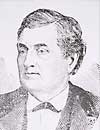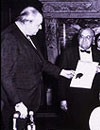Arkansas
Gov. Elisha Baxter
- January 6, 1873 - November 12, 1874
- Republican
- September 1, 1827
- May 31, 1899
- North Carolina
- Married Harriet Patton; six children
- Army
About
ELISHA BAXTER was born in Rutherford County, North Carolina on September 1, 1827. He received a limited education, and procured an appointment to West Point, but declined, upon his father’s insistence. In 1852, he moved to Arkansas, where he opened a mercantile business, which later went bankrupt. Baxter studied law, and was admitted to the bar in 1856. He was elected to the Arkansas House of Representatives, serving from 1854 to 1856, and 1858 to 1860. At the outbreak of the Civil War, Baxter, refusing to fight, fled to Missouri, was captured, and imprisoned, and tried for treason. He escaped and reached Union lines, where he realized his duty to fight. Baxter then recruited with the 4th Arkansas Mounted Infantry, where he served as colonel. In 1864, he was appointed chief justice of the Arkansas Supreme Court, and in 1868, served on the bench of the Third Circuit Court until 1873. Baxter ran and won the popular vote in the 1872 gubernatorial election against Joseph Brooks. Brooks contested the election, but the legislature favored Baxter. On January 6, 1873, Baxter was sworn into office as Arkansas’s 10th governor. During his term, he proposed reform and an amendment to reenfranchise whites. He opposed railroad bonds and refused to issue any more. This caused tremendous difficulty for Baxter and resulted in Brooks’ party’s desertion and the Supreme Court’s ruling that he had won the election. Brooks and his armed force physically ousted Baxter from the State House on April 15, 1874, thus beginning the Brooks-Baxter War, which occurred during April and May 1874. The armed conflict between the supporters of two rivals for the governorship Joseph Brooks and Elisha Baxter started in Little Rock and spread to other parts of Arkansas. An appeal was sent to President U.S. Grant to settle the dispute. President Grant assigned the dispute to the Arkansas Legislature, which sided for Baxter and called for a special convention. A new constitution was formed, which resulted in the vacating of all state offices and the shortening of Baxter’s term from four years to two. The recognition of Elisha Baxter as the governor, brought a practical end to Republican rule in the state and thus ended the era of Reconstruction in Arkansas. Baxter left office on November 12, 1874, declining the 1874 Democratic nomination. He ran unsuccessfully for the Arkansas Legislature in 1878, and returned to his farm near Batesville. Baxter practiced law until his death on May 31, 1899. He is buried at the Oak Lawn Cemetery, Batesville, Arkansas.
Source
Sobel, Robert, and John Raimo, eds. Biographical Directory of the Governors of the United States, 1789-1978, Vol. 1, Westport, Conn.; Meckler Books, 1978. 4 vols.
Donovan, Timothy P., and Willard B. Gatewood, Jr., The Governors of Arkansas, Essays in Political Biography, Fayetteville; The University of Arkansas Press, 1981
Herndon, Dallas T., Centennial History of Arkansas, Vol. 1, Chicago, Little Rock, The S.J. Clarke Publishing Co., 1922. 3 vols.
Old State House Museum











